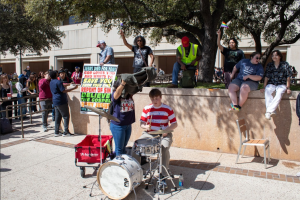Students express mixed opinions about the efficacy of social media
‘I feel like it has an impact on everybody’s mental health’
October 26, 2021
The 21st century is often referred to as the age of social media. College students in particular are a demographic whose daily lives are greatly affected by social media.
Overall, UTSA students expressed mixed opinions about social media.
Many pointed out that they found social media to have a more negative impact on users’ mental and physical health.
“I think that, in general, social media is a negative thing, but it’s something that can potentially have many positive effects. As far as [being] a negative thing, I just think that students lose a lot of productivity and it can hinder them, especially in sleep and studying,” freshman Michael McGinais said.
April Garza, a sophomore, echoed similar concerns about social media affecting productivity.
“I’m a procrastinator at heart. And so, with social media, that just does not help at all. It just creates a whole cycle and it’s almost like a routine at this point, where I just end up on my phone for two hours and then I’ll do something. So, it’s just trying to break that routine, but it’s just something that is so hard to break out of,” Garza said.
Senior Fabrice Ntalindwa expressed similar concerns, adding that social media often promotes comparison.
“I think people focus a lot on what’s going on in other people’s lives instead of actually trying to work on [themselves] and their lives. I think in general it can be destructive,” Ntalindwa explained.
On the other hand, Meira Sullum, a freshman majoring in computer science, expressed that social media can have positive effects, including the social connectivity that social media lends. Sullum further stated that there are more ways to prevent things like cyberbullying rather than completely wiping out social media from our individual lives.
“Personally, I think that it has a more positive effect just because you can communicate with a bunch of people and you can talk to people all over the world instead of people that are just [in] your community,” Sullum said.
Sullum was, however, quick to acknowledge that social media can “make people kind of look down on themselves because they don’t look [a certain way].”
Cheyenne Gillis, a senior majoring in civil engineering, also pointed out the toll social media can take on the mental health of young users.
“I feel like it has an impact on everybody’s mental health, but when you’re younger, you don’t know how to filter it as easily, you don’t have the experience to know,” Gillis said.
“You have to take [things] with a grain of salt, you have to know that it might not be a reputable site…I think it can impact everybody’s mental health in a negative way, especially when you see something and you click and it takes you further and further down that especially negative rabbit hole. It’s not healthy.”
Makhi Proctor, a sophomore, also expressed that children and younger individuals should not be on social media due to its negative impact on mental wellbeing.
“Personally, I don’t feel like kids that are in elementary and middle [school] should be using any type of social media, because that’s a time where their mind is most pure. They should be more focused on school and not trying to fit into the social norms,” Proctor said.
Given its effects on productivity and mental health, social media can become a hard cycle to break: as sophomore Garza further pointed out.
Garza explained that while taking breaks from social media can prove to be effective, doing so may be very hard to implement.
“The times that I do step away [from social media] and do stuff … it makes me feel a little bit better about myself. So I’ve been working on trying to find the balance, but it’s just kind of hard,” Garza said.
Along with varying opinions about social media in general, students also expressed the advantages and disadvantages of social media activism.
“I think it’s better than nothing. I mean, I think it does help, I think it does put [issues] in [the] ears of people that might not have heard of [those issues] otherwise,” Gillis said. “I think it does spread the word that would have otherwise been kept quiet. Ten years ago you didn’t hear about problems because they didn’t have a platform that they could easily access. So I think it is useful and it is, you know, a good start but … you can’t just do that and then stop … you have to keep going. It’s just like a starting point.”
Ntalindwa pointed out that social media can be very effective when used in the right ways.
“Honestly, my opinion [is that] most of the activism that goes on online is for show. I think … it’s good, it has its place if you wanna create awareness, if you wanna make people know what’s going on, I think it’s good to go on social media and say ‘Hey, this is what’s going on.’ But they need your help in actively doing something,” Ntalindwa said, echoing a similar idea that there is more to activism than just voicing concern on social media.
The current generation has a very complex relationship with social media: something that is evident in the ways in which students convey their ideas and opinions.
“Since we grew up with social media, we kind of attach our identity with our social media so it’s kind of hard stepping away from it,” said Garza.
As evidenced by the statements of students, social media can be hard to navigate. UTSA students expressed both positive and negative views on social media, highlighting the paradox social media often presents to the younger generation.









